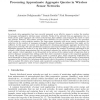Free Online Productivity Tools
i2Speak
i2Symbol
i2OCR
iTex2Img
iWeb2Print
iWeb2Shot
i2Type
iPdf2Split
iPdf2Merge
i2Bopomofo
i2Arabic
i2Style
i2Image
i2PDF
iLatex2Rtf
Sci2ools
145
click to vote
IS
2006
2006
Processing approximate aggregate queries in wireless sensor networks
In-network data aggregation has been recently proposed as an effective means to reduce the number of messages exchanged in wireless sensor networks. Nodes of the network form an aggregation tree, in which parent nodes aggregate the values received from their children and propagate the result to their own parents. However, this schema provides little flexibility for the end-user to control the operation of the nodes in a data sensitive manner. For large sensor networks with severe energy constraints, the reduction (in the number of messages exchanged) obtained through the aggregation tree might not be sufficient. In this paper we present new algorithms for obtaining approximate aggregate statistics from large sensor networks. The user specifies the maximum error that he is willing to tolerate and, in turn, our algorithms program the nodes in a way that seeks to minimize the number of messages exchanged in the network, while always guaranteeing that the produced estimate lies within the...
Related Content
| Added | 13 Dec 2010 |
| Updated | 13 Dec 2010 |
| Type | Journal |
| Year | 2006 |
| Where | IS |
| Authors | Antonios Deligiannakis, Yannis Kotidis, Nick Roussopoulos |
Comments (0)

